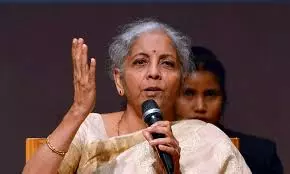AA Edit | Bottom-up reforms to boost jobs

Finance minister Nirmala Sitharaman
Union finance minister Nirmala Sitharaman has tabled the National Democratic Alliance 3.0 government’s first Economic Survey in the Lok Sabha. While the Survey takes stock of the Indian economy as customary, it also indicates the government’s economic policy preferences a day ahead of the minister’s Union Budget speech.
Hinting at the government’s future economic policy in “Chapter 5, Medium Term Outlook — A Growth Strategy for New India”, the Economic Survey laid emphasis on bottom-up reforms, which appears to be a U-turn on trickle-down policy by successive governments. Under the trickle-down policy, the government aimed at creating wealthy businesses, expecting that the prosperity would trickle down to others.
As the bottom-up reforms are aimed at balanced and inclusive growth, the government appears to be keen on creating wealth for the poor and middle classes, expecting that prosperity at the bottom of the pyramid would create business opportunities for the rich. If the government is serious on this front, it would be a monumental course correction since the 1990s Liberalisation.
Another policy preference identified in the Economic Survey is the development of Micro, Small and Medium Enterprises (MSMEs). Ever since India gained independence, small and medium scale businesses have been the largest employer. However, the rollout of Goods and Services Tax, which created a single market, gave a great advantage to big businesses over MSMEs, which reflected in soaring revenues and market capitalisation. However, with GST still in place, it is to be seen how the government plans to support the small entrepreneurs, who could create jobs for people.
The Survey also states that the government needs to recognise the potential of agriculture as an engine of future growth. It means the government will take steps to boost agricultural productivity and encourage rural entrepreneurs to set up food processing industries, which could create employment in rural areas.
Another goal explained in the Economic Survey is bridging the education-employment gap — one of the most important tasks for the government and the society. Its focus on financing green transition in India seeks to help people in their transition to non-fossil mode of transport, thereby securing energy independence for the country.
The goals seek to address criticism levelled against the BJP government during the Lok Sabha elections. If the government could achieve the desired results, it could help the country achieve a sustainable economic and social growth.
Next Story
